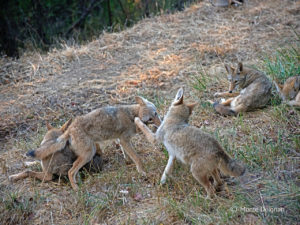FOR IMMEDIATE RELEASE – November 13, 2018
Groups Seek to Stop Coyote Killing Contest in Burns, Oregon
State and National Organizations Call for Cancellation of Event and a Statewide Ban on Wildlife Killing Contest
BURNS, Ore. — State and national conservation and animal welfare organizations have sent a letter to the Oregon Farm Bureau requesting cancellation of the upcoming Young Farmers & Ranchers (YFR) 1st Annual Coyote Hunting Tournament in Burns, and asking for support of a statewide ban on wildlife killing contests in Oregon. The letter was sent in advance of the YFR Leadership Conference that took place last weekend in Redmond.
Wildlife killing contests, in which participants compete for cash and prizes for killing the heaviest or greatest number of the targeted species, are a gruesome spectacle, akin to a blood sport like dogfighting and cockfighting. While this event is advertised as a coyote killing contest, often foxes, bobcats, and in some Western states, even mountain lions and wolves are targeted in such events. A 2018 video of an undercover investigation by the Humane Society of the United States showed contest participants amassing piles of coyote and fox carcasses to be judged for prizes, and laughing and posing for photos in front of the dead animals. In many contests, youth are encouraged to participate, and hunting equipment and high-powered rifles—including AR-15s—are awarded as raffle prizes.
The Burns coyote killing contest is slated to take place from November 30 – December 2, 2018. According to the contest advertisement, teams will compete to kill as many coyotes as possible; the team with the greatest total weight of all coyotes killed will win. A portion of the proceeds will go to the YFR program.
Wildlife killing contests contravene modern, science-based wildlife management principles. In a signed statement, more than 65 prominent conservation scientists refute myths perpetuated by special interest agricultural and trophy hunting groups that killing contests are an effective method for managing carnivore populations. Using peer-reviewed literature, the statement explains that there is no scientific evidence to support claims that indiscriminate killing of coyotes prevents livestock loss, boosts populations of game animals like deer, or effectively reduces coyote populations. Killing contests more than likely lead to a greater abundance of coyotes and more conflicts because it creates instability in coyote family structures.
A recent issue of Oregon Small Farm News highlighted research finding that lethal control of coyotes only increased livestock losses, and that coyotes with no record of livestock depredation, and who have established themselves in a territory that overlaps with sheep pastures, can actually prevent livestock losses by excluding coyotes from neighboring packs who may have learned to kill sheep.
“Killing coyotes for fun and prizes is ethically repugnant, morally bankrupt and ecologically indefensible,” said Camilla Fox, founder and executive director of Project Coyote. “It is high time this practice is banned in Oregon, following the lead of California and Vermont.”
“These gruesome wildlife killing contests teach Oregon’s youth nothing about sportsmanship, and instead send them the dangerous message that hunting is about nothing more than winning cash and prizes,” said Kelly Peterson, Oregon senior state director for the Humane Society of the United States.
“Killing contests have no place in modern, science-based wildlife management and violate the good stewardship of our land and natural resources and the humane values that Oregonians expect from our state’s ranchers and farmers.”
“These competitions are symptomatic of a broader problem of misguided wildlife governance by state agencies that fails to recognize and value the crucial ecological roles of native predators and that considers it more expedient to kill than to implement responsible, science-based conservation,” said Dave Parsons, MS, retired career wildlife biologist with the U.S. Fish and Wildlife Service and Project Coyote Science Advisory Board member.
Wildlife killing contests are a violation of the Public Trust Doctrine, a foundational judicial principle mandating that governments hold natural assets, including wildlife, in trust for the general public and future generations. Allowing a minority of the population to slaughter coyotes en masse even though the majority of people value the intrinsic, ecological and aesthetic value of native carnivores damages the reputation of state wildlife management agencies and sportsmen and sportswomen alike.
In recent years, California and Vermont have banned coyote killing contests, and Oregon will consider similar legislation in 2019. Recently, the city council of Albuquerque, New Mexico, unanimously passed a resolution calling for a statewide ban on coyote killing contests. The city of Tucson and Pima County in Arizona have also passed similar resolutions in recent years.
Oregon has more than its share of wildlife killing contests, including an annual event in Harney County. Since coyotes are considered predatory animals, they can be hunted year-round, and there are no limits as to how many coyotes someone may kill or the manner in which they’re killed.
* * * * *
View a copy of the letter sent to the Oregon Farm Bureau regarding the Burns coyote killing contest here.
See the Humane Society of the United States’ in-depth look at wildlife killing contests, “Better off alive,” in the September-October 2018 issue of All Animals magazine here.
View the National Coalition to End Wildlife Killing Contests’ mission statement and list of members here.
Learn about Project Coyote’s award winning documentary, KILLING GAMES ~ Wildlife In The Crosshairs, that exposes wildlife killing contests here and here.


